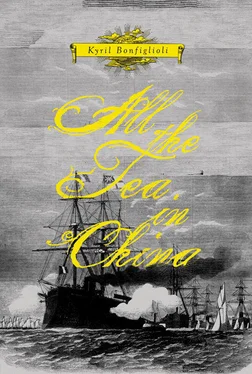
Peter’s coolness, in the ensuing days, was reflected twofold by the Second, whose taciturnity changed to a complete unawareness of my presence. The Captain, too, chose to pretend that I was invisible and, when I appeared, would stump to the weather-rail and occupy himself with his telescope. It was otherwise with the common sailors of the crew: their smiles were broad and they tugged many a forelock as I strolled the deck. A proud, awe-struck Orace brought Peter and me a succession of splendid messes from the galley which made me confident that I had won the Doctor’s approval. Blanche made frequent visits to where Lubbock lay groaning in delirium, as a woman should, but there was no cause for jealousy. Once, when she passed close to me and no one was in sight, she smiled at me enigmatically and made the most delightfully suggestive moue with her wet, red lips.
When we were eating Peter would relax a little unless I brought up the subject of the duel, whereupon he would become cold and distant again. Looking back in time, now that I am in the prime of life and have purged myself of all vice and vanity, it occurs to me that he was trying to stifle in me a certain overweening self-satisfaction which he may have wrongly believed I was exuding in those days.
Despite the light airs, our great press of canvas brought us in a very few days to within sight of the island of Lin Tin. This means “Single Nail Island” but the resemblance is only apparent to the Chinese. Many things were apparent to the Chinese at the time of which I speak, things which were apparent only to them. They held this truth self-evident, for example: The Emperor, The Son of Heaven, The Dragon, bore the name Tau Kuang, which means Glorious Rectitude, and was, naturally, Lord of the World. It was serenely admitted that there were distant regions of his Empire, such as England, which had not yet been blessed with the ineffable radiance of The Heavenly Face, but this was a pardonable, childish ignorance and would be corrected when we grew old enough to learn. (This was comparable with the splendid common sense of the British Empire-builder when confronted with cannibalism and the feeding of worn-out old ladies to the crocodiles: get the beggars to understand hut-tax and road-making first, civilisation will follow. It was the missionaries who spoiled things with their prudery and prurience; to this day they cannot understand that making black women cover their breasts rehearsed the Fall — the key passage is at Genesis 3 vii — nor can they see that assuring the base savage that he is the equal, not only of his witch-doctor but also of his District Commissioner, is a source of bewilderment to the savage, resentment to the witch-doctor and a great nuisance to the D.C. I digress, but informatively: learn, learn.)
Our baseness — that of us Western Ocean Barbarians — was controlled by forbidding us to address anyone but the merchants of the Hong, or Ko’Hong, a venal body of contractors who purchased concessions to trade with us from the Hai Kwan Pu, a relative of the Emperor (who had in turn bought his unpaid but immensely lucrative appointment) and whose title was abbreviated in the usual, irreverent British way to “The Hoppo”.
The breath-taking absurdity of these people’s arrogance had been shown only a few years before — in 1834, I fancy — when Lord Napier himself, as Special Envoy of His Britannic Majesty, arrived at Canton and proposed to pay a visit of protocol on the Viceroy of the province. The first thing that happened was that the merchants of the Ko’Hong were terrifyingly rebuked for having allowed any person not a merchant to enter the Factories suburb. “Tremble!” the letter to them concluded, “Intensely tremble!” The next thing was that, finding it impossible to gain an audience of the Viceroy, Lord Napier sent a State Letter by his secretary to the Gate of the Petitions outside Canton. For hours this letter was proffered to one merchant or official after another, but none would touch it, for it was superscribed with a Chinese character which means “Letter”. Had it borne the character for “Petition” someone might have dared to carry it to some petty clerk in the Viceroy’s bureau. The third thing was that Lord Napier, addressed by a character which meant “elaborately nasty”, was urged, then ordered, to return to Macao.
If you find that hard to believe, read this, which is just as true. As late as 1839 a Mandarin or Commissioner called Lin Tsê-hsü wrote to Queen Victoria herself (naturally, the Celestial One could not deign personally to recognise so piddling a tributary sovereign) and rebuked her roundly for base ingratitude at the Celestial Bounty, saying that punishment for her disobedience would be, for the time being, suspended, and suggesting ways in which she could show proper submission without losing too much face. Lin, by all accounts, was a man of great intelligence; it is hard to tell whether his tongue was in his cheek and, if so, how far. But then, it is hard to tell anything about Orientals. One might say that they are the English of the East.
Perhaps the best of all illustrations of the working of their minds is the well-recorded tale of the first steam-ship to appear at the Bogue. They picked up a pilot at the Grand Lemma (the largest of the Ladrone Islands) and were taken through the island channels to the Macao Roads without the least flicker of curiosity from the pilot. Dropping him at Macao, the Captain, unable to contain himself, asked the pilot what he thought of the new system of propulsion. The latter glanced back at the funnel without interest and replied that this way of driving a ship had been invented in the Celestial Empire some thousand years ago, but had been discarded as too dirty and extravagant.
When I first heard that story I laughed immoderately. Later, I came to wonder uneasily whether the pilot might not have been speaking the truth.
This island of Lin Tin is three miles long and is occupied chiefly by a mountain of some two thousand feet. Only the anchorage has interest. The first and finest sight was an ancient ship which, had you seen it in a storm in the Southern Seas, you would have taken for the Flying Dutchman itself. It was, I was told, an old “country wallah” — teak-built in India perhaps two hundred years ago and modelled on an even earlier design. As the name suggests, these ships were for the “country-trade” only and dabbled in all sorts of trading as well as opium. This one had been on the Coast since the end of the last shipping season so, despite our digression with the typhoon, we were still the first in the field.
Apart from a swarm of egg-boats, sampans and such Chinese craft, the only other vessels in the anchorage were the receiving ships: large, dismasted hulks which were nothing more or less than floating warehouses — although from the gay awnings, the stove-chimneys, the pots of flowering plants and the strings of laundry you might have thought them floating tenements. We laid alongside one of them and a “brow” was quickly laid from our deck to one of the many entry-ports. I was loafing at the entrance of the galley when four of our men laboured up from ’tween decks bearing a makeshift stretcher. I had known that Lubbock’s wound was not healing well but was nevertheless startled at the change in his appearance: his face was yellow and the skin stretched tightly over his bones, his hands were like claws, plucking at the light sheet which covered him and his head rolled to and fro in a horrid way.
“Why does his head wag so?” I asked the Doctor. “Is it delirium?”
“No, Maz Cleef,” he replied gravely. “I think he looking for you .” Ever ready to receive an apology and give a forgiveness, I strode towards what had been Lubbock. So soon as I came within his range of vision the horrid wagging of the head ceased, sure enough. His lips, crusted with sordor, cracked open and he croaked something inaudible. I bent over him, so as to hear what might well be his dying words of repentance.
Читать дальше













